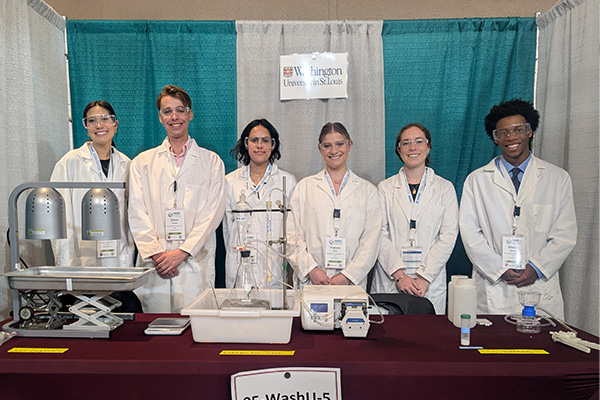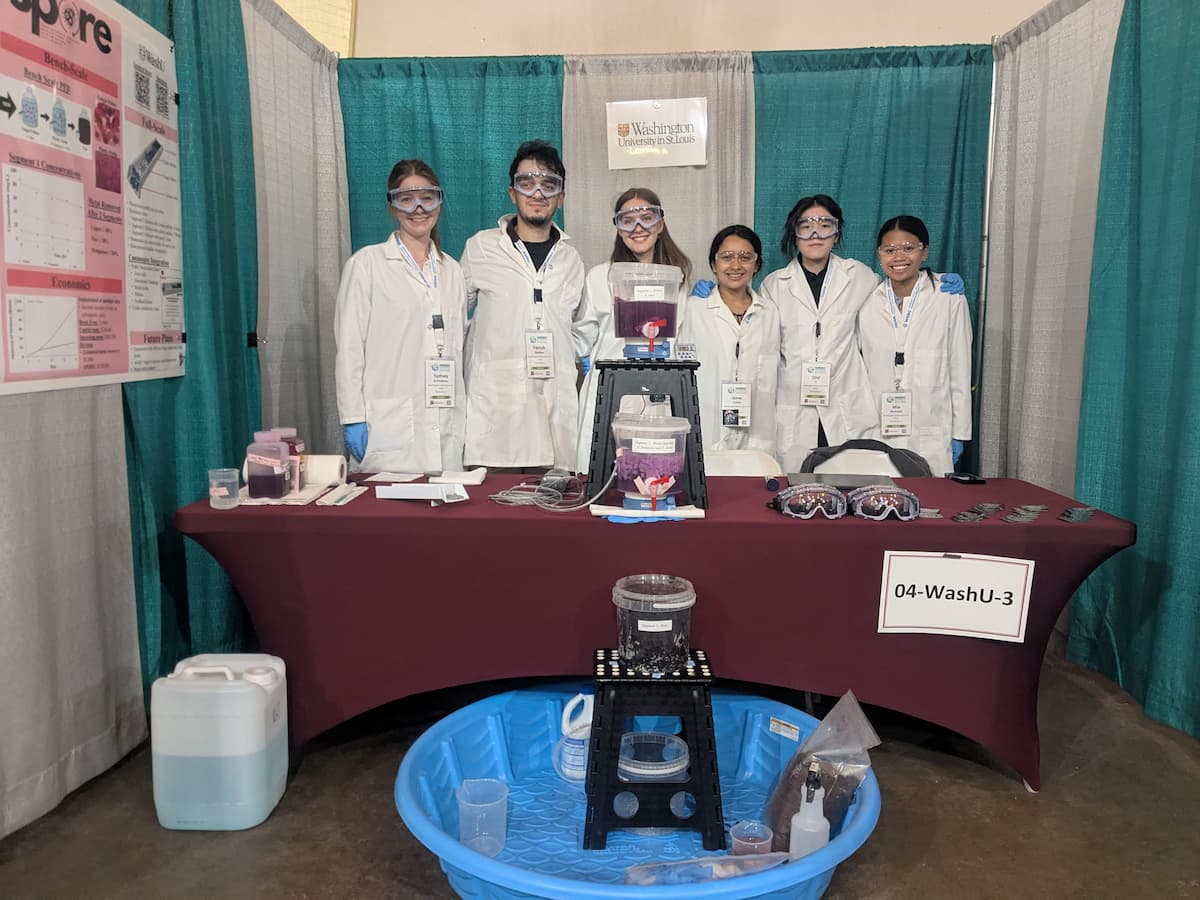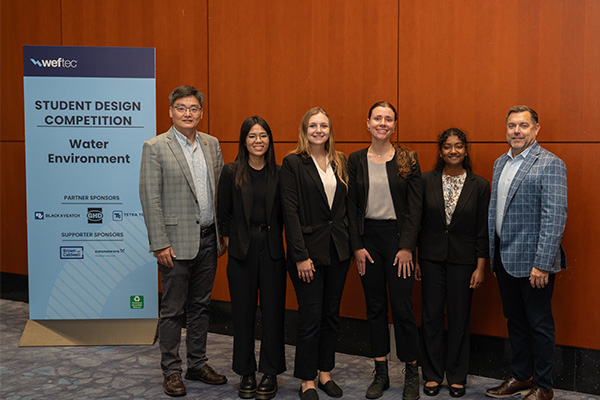WashU students win four awards at the 2025 WERC environmental design contest
Twelve seniors competed in the 35th annual WERC Environmental Design Contest as a part of their environmental engineering capstone course

Twelve senior students in the Environmental Engineering Capstone course in the McKelvey School of Engineering at Washington University in St. Louis competed and won four awards in this year’s WERC Environmental Design Contest held April 6-9 in Las Cruces, New Mexico.

(Credit: Kristen Wyckoff)
“The students’ performance was outstanding,” said Ben Kumfer, research assistant professor and senior lecturer of energy, environmental & chemical engineering, who also served as faculty adviser for the students along with Kristen Wyckoff, senior lecturer of energy, environmental & chemical engineering, and Jason (Zhen) He, the Laura and William Jens Professor of Energy, Environmental & Chemical Engineering. “I was especially impressed with the preparation and delivery of their presentations and their thoughtful responses to tough questions from the judges.”
Twelve students comprised two teams for the contest, for which each team selected and worked on a real-world task proposed and designed by industry and government agencies. The tasks for this year’s competition included mitigating dust in lunar habitats, recovering valuable constituents from produced water, fungal treatment of mining-influenced waters, renewable energies and post-wildfire watershed restoration.
Team “FUNguys for the Future,” led by Cristina Ciborowski Escoffery, received third place in the bench scale competition and third place overall in Task 3, which was to use fungi to remove metal from mining-influenced water located near legacy mines. The team also received a peer award. Team members were Ciborowski Escoffery, Sydney Rottinghaus, Mia Phutrakul, Farruh Nabiyev, Qiqi Li and Jeme Chavez.
The team designed a three-stage treatment system that used multiple strains of fungi to remove heavy metals, specifically copper, zinc and manganese. In the first stage, they cultivated and made pellets from Aspergillus niger, which initiated the treatment process by absorbing target metals from mining-influenced water. In the second stage, the team grew a biofilm comprised of Aspergillus fumigatus and Trichoderma virens on a plastic trickling filter media commonly used in wastewater treatment systems. Finally, the team used peat to absorb and neutralize the acid created as treatment byproducts.
Ciborowski Escoffery said her inspiration came from research she conducted in the summer of 2024 at the University of Tennessee, Knoxville, where she worked on growing different types of moss on concrete and seeking whether moss could be implemented on urban building facades to reduce energy use and store carbon.
“When I read the description of the fungus task, I was inspired to have a self-sustaining system with the capacity to store pollutants,” Ciborowski Escoffery said.
Ciborowski Escoffery credited the team’s success to the dedication and enthusiasm each member brought to the project. Although she was elected as team leader, she emphasized that the group operated with a strong sense of shared responsibility.
“There wasn’t a power imbalance or a lack of accountability. Everybody was very willing and enthusiastic to jump into tasks,” Ciborowski Escoffery said.
The second team, “WashU Water Warriors,” led by Michelle Kane, won third place for their bench-scale demonstration in Task 5, which tasked teams with recovering constituents from a pre-treated brine concentrate. Team members were Kane, Erin Reardon, Karina Ravipati, Frannie Katz, Dillon Colbert and Wes Beamer.
The team focused on recovering lithium carbonate for use in lithium-ion battery manufacturing and two additional products: ice-melt rock salts and carbonate fertilizer. Their system followed a three-step process. First, they used solar evaporation to get salts from the brine. Next, the team used a lithium-ion sieve adsorption technique to capture lithium ions. Finally, the team applied carbon dioxide bubbling to form carbonate precipitates.
Kane said this process was primarily chosen because of its ability to significantly reduce waste. She mentioned that the team was inspired to explore this topic because they were interested in water resources engineering.
“This experience deepened my interest in environmental engineering, specifically in the water sector, by showing me how technical knowledge can be directly applied to solve real-world environmental problems,” said Kane, who is planning to work in drinking water treatment after graduation.
Kumfer said the WERC competition allowed students to apply their classroom knowledge to complex real-world environmental challenges.
“Sometimes early ideas do not work out after closer examination, which can be a little disheartening,” Kumfer said. “But these students persevered. Through study, creative thinking and determination, they were able to invent effective solutions.”
Wyckoff highlighted the value students consistently find in participating in the WERC competition.
“Students find it is a rewarding experience where they get feedback from real industry leaders, business leaders and engineers,” Wyckoff said. “The competition requires a lot of hard work, but students usually feel proud and relieved by the end.”
Reflecting on her experience, Ciborowski Escoffery highlighted how the competition reshaped her perspective as an engineer.
“The problem we were addressing in the competition is just one that exists and somebody is going to tackle it. I had a hard time visualizing myself as that person before this project,” Ciborowski Escoffery said. “Now I see how attainable these goals are and how WashU has prepared me to be a better engineer.”






